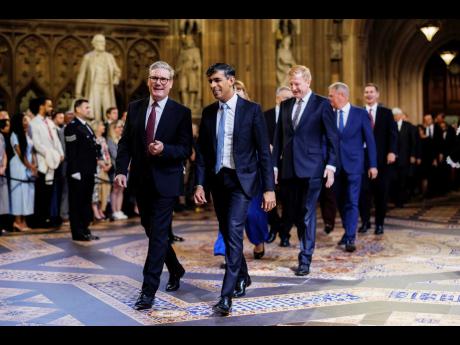New gov’t announces plans for ‘national renewal’
LONDON (AP):
Britain’s new Labour Party government promised to calm the country’s febrile politics and ease its cost-of-living crisis as it set out its plans for “national renewal” at the grand State Opening of Parliament on Wednesday.
Stabilising the UK’s public finances and spurring economic growth were at the centre of Prime Minister Keir Starmer’s legislative agenda, announced in a speech written by government officials and delivered by King Charles III.
“My government will seek a new partnership with both business and working people and help the country move on from the recent cost-of-living challenges by prioritising wealth creation for all communities,” the king said in a speech to hundreds of lawmakers and scarlet-robed members of the House of Lords.
Starmer, who has moved his left-leaning party towards the centre since becoming Labour leader in 2020, campaigned on a promise to bring bold change to Britain at modest cost to taxpayers. He aims to be both pro-worker and pro-business, in favour of vast new construction projects, and protective of the environment. The risk is, he may end up pleasing no one.
In a written introduction to the speech, Starmer urged patience, saying change would require “determined, patient work and serious solutions”, rather than easy answers and “the snake oil charm of populism”.
The King’s speech is the centerpiece of the State Opening, an occasion where royal pomp met hard-nosed politics, as the king donned a diamond-studded crown, sat on a gilded throne, and announced the laws his government intends to pass in the coming year.
Labour won a landslide election victory on July 4 as voters turned on the Conservatives after years of high inflation, ethics scandals and a revolving door of prime ministers. Starmer has promised to patch up the country’s ageing infrastructure and frayed public services, but says he won’t raise personal taxes, and insists change must be bound by “unbreakable fiscal rules”.
But he clearly believes in an active role for the state in public life. Wednesday’s speech included 40 bills – the Conservatives’ last speech had just 21 – ranging from housebuilding to nationalising Britain’s railways and decarbonising the nation’s power supply with a publicly owned green electricity firm, Great British Energy.
The government said it would “get Britain building”, setting up a National Wealth Fund and rewriting planning rules that stop new homes and infrastructure being built.
Economic measures included tighter rules governing corporations and a law to ensure all government budgets get advance independent scrutiny. That aims to avoid a repetition of the chaos sparked in 2022 by then-Prime Minister Liz Truss, whose package of uncosted tax cuts rocked the British economy and ended her brief term in office.
The government promised stronger protections for workers, with a ban on some “zero-hours” contracts and a higher minimum wage for many employees. Also announced were protections for renters against shoddy housing, sudden eviction and landlords who won’t let them have a pet.
The government promised more power for local governments and better bus and railway services – keys to the “levelling up” of Britain’s London-centric economy that former Conservative Prime Minister Boris Johnson promised but largely failed to deliver.
Though Starmer eschewed large-scale nationalisation of industries, the government plans to take the delay-plagued train operators into public ownership.

